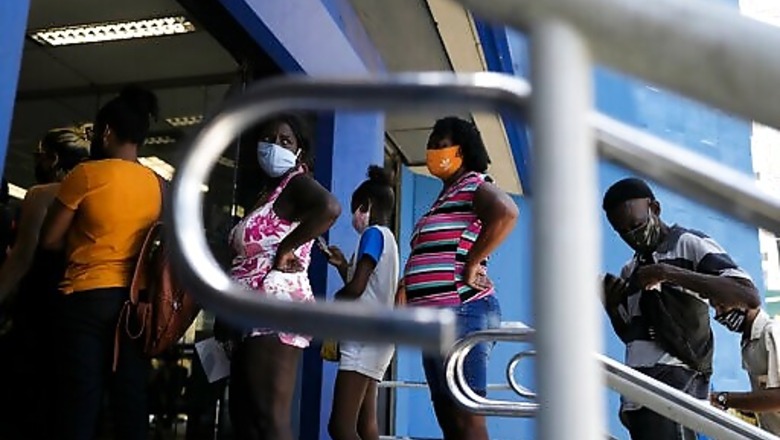
views
RIO DE JANEIRO: Brazil’s government rolled out a new welfare program Wednesday, temporarily ensuring much needed financial help for millions of families while also worrying experts because funding and other details have yet to be determined.
The cash-transfer program is called Brazil Aid and replaces Bolsa Familia (Family Grant), a widely praised, two-decade-old initiative of the leftist Workers’ Party. The new program increases the monthly stipend for each beneficiary to an average of 224 reais ($40) from 190 reais and also will raise the number of recipients.
It is expected to reach 17 million families by year-end, up from the 14.5 million enrolled in Bolsa Familia before the pandemic but less than half of those who received emergency pandemic payments, which ended last month. That has caused some confusion for many Brazilians about whether they remain eligible for assistance.
President Jair Bolsonaro created Brazil Aid in August with an emergency provisional measure that Congress must ratify before Dec. 9. The clock is ticking, but lawmakers in the Chamber of Deputies are awaiting Senate approval of a proposed constitutional amendment that would raise maximum government spending and free up funding for the program.
The amendment is divisive, however, as it has heightened investor concerns over the potential for excessive government spending.
Political analysts, meanwhile, say Bolsonaro is effectively rebranding an existing program to buoy his reelection chances. He is expected to compete in next year’s election against former President Luiz Incio Lula da Silva, who launched Bolsa Familia in 2003. Bolsonaro is trailing in early polls, after a bump in his approval ratings from the government’s pandemic welfare program faded.
Brazils pandemic aid was among the most generous in the world, and had already prompted some market concern that Latin Americas largest nation was spending beyond its means. Brazil Aid, while a sharp drawdown from the pandemic outlay, will represent additional costs over that of Bolsa Familia.
Pedro Guimares, chairman of the state-owned bank distributing welfare aid, Caixa Econmica Federal, sought to allay fiscal concerns at a news conference Wednesday.
From the payment standpoint we have no problem. Zero problem, Guimares said.
Regardless of funding, critics have questioned the reasons for discontinuing a welfare program that drew broad acclaim for its achievements. Bolsa Familia was the subject of thousands of academic studies in Brazil and abroad, which reported significant reductions in poverty, inequality and infant mortality.
Researchers also found greater access to basic health and said school attendance one requirement to receive the benefit also improved. The birth rate of Brazils poorest families decreased, contradicting a common claim that the program would encourage women to have more children.
There were always very modest sums, but it always worked well. Its a program that was cheap, efficient and effective, said Pedro Ferreira de Souza, who co-authored a 2019 study on Bolsa Familia for the government’s Institute for Applied Economic Research. This new program raises more questions than it answers.
Brazil Aid does create a series of new benefits, including for working parents who cannot secure childcare and for small family farmers in exchange for food donations. These provisions, however, wont come into effect until additional funding has been earmarked.
You have these nine new types of benefits, many of which are variants of previous benefits. Theyre not (entirely) new, but theyre interesting, said Marcelo Neri, director of the Getulio Vargas Foundations social policy center.
Tereza Campello, who was part of a team that worked on the creation of Bolsa Familia in 2003, expressed anger that a longstanding pillar of Brazil’s fight against poverty is being toppled.
Im outraged. Its not even sadness, its outrage, said Campello, who later served as Brazil’s minister of social development and fight against hunger. In her time as minister, Campello said, she received delegations from dozens of countries interested in learning about Bolsa Familia.
What drives this new program? Its not scientific evidence, its not peoples reality. Its improvisation and electoral interest. These are the only two things that drive this public policy, she said.
On Wednesday, some Brazilians headed to bank branches to inquire about payments, complaining about the shortage of information regarding who is eligible for the benefits and how much they will be. Lines were spotted in some parts of Brazil, though their sizes were a far cry from the chaos some analysts had predicted.
Waiting in one line in Rio de Janeiro, Suzanne Vieira, 22, said she had been getting the emergency pandemic aid and was surprised to find no money deposited into her bank account this month. She is unemployed and has two children, with a third on the way.
I dont know what Im going to do, she said.
___
Associated Press writers Dbora lvares in Brasilia and Diarlei Rodrigues in Rio de Janeiro contributed to this report.
Disclaimer: This post has been auto-published from an agency feed without any modifications to the text and has not been reviewed by an editor
Read all the Latest Politics News here


















Comments
0 comment